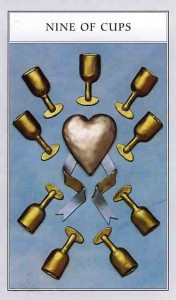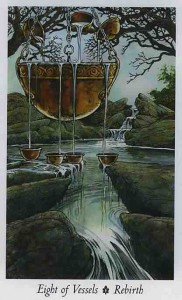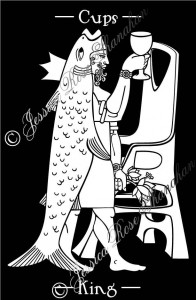
*
The King of Cups was the final card illustrated for the Tarot of the Absurd. My baby was coming soon. Working all day in front of the computer made my ankles disappear into puffiness. I needed a King, and I needed him fast. I cheated— I, too, stole the image of an ancient god.
At first, humans were rather wretched and lived like all other wild beasts. But within one year, a reasonable beast named Oannes emerged from the Erythian Sea, at the point where it borders Babylonia (i.e.: the Persian Gulf). He had a fish’s body. Above his fish’s head he had a man’s head. Human feet emerged from beneath his fish’s tail. His voice was human. He was never seen to eat.
He passed his days among civilization. He taught the use of letters, sciences and arts of all kinds. He taught men to construct cities, to found temples, and to compile laws. He explained the principles of geometry. He made them learn their plants and showed them how to harvest. In short, he humanized them. No one has ever improved on his instructions. And when the sun set, Oannes retired into the sea, for he was amphibious. After this, there appeared other animals like Oannes.**
Over the years, the confusion of gods multiplies. Who came from whom? Where are the origins? One can trace the threads of mythology’s history like a spider’s web, each strand weaving back upon the others to create a structural whole that makes sense for the present time. Deconstructing mythology— deconstructing the spider’s web— is fascinating from a historical point of view, from a story-teller’s point of view, and from the point of view of those interested in following multitudes back to unity. Mythology is the bizarre sort of lineage where a parent begets a child and the child becomes not just a parent, but the parent of his own self.
Deluge and recovery. Subjugation, assumption, resurrection. In order to better subjugate the conquered people, the gods of the victors assume characteristics of the gods of the vanquished, and the gods of the vanquished rise again. Thus the names and places of gods change through the ages, one god after another taking on similar forms and forces, gods amassed and gods split
Adapa. Oannes. Dagon. Poseidon. Neptune. Triton. Delphin. Noah. Names of gods come and go, but the robes of priesthood have changed very little. Three or five or seven thousand years later, Catholic popes and bishops still wear the headdress dedicated to an ancient Babylonian water god.
… and after this, there appeared other animals like Oannes…
***
* My illustration is very, very closely modeled after a bas-relief carving of a fish-garbed priest on temple of the god Ninurta (Saturn) at Kalhu (biblical Calah), ca. 883-859 BCE Assurnasirpal II. Source: Anthony Green, Gods, Demons and Symbols of Ancient Mesopotamia, An Illustrated Dictionary, p. 83. fig. 65. Published in London by the British Museum, in association with the University of Texas Press, Austin. 1992.
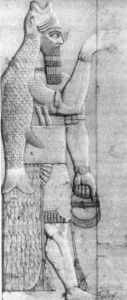
** Story, in italics, adapted from Berossus, a 3rd century BCE Babylonian priest. Oannes is born of the Mesopotamian god Enki, whose origins go back to the 5th century BCE in Sumer; i.e.: as far back as we have writing.
*** Pen&Ink ilustration by Syrena Seale. Image used without permission, but I would like to use it, with permission, in my book. To see the original image and to see more of Syrena Seale’s work, click here or click on her illustration.
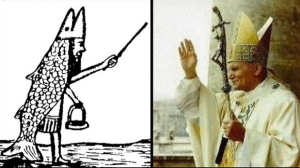




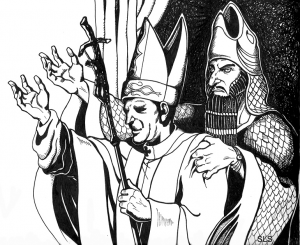
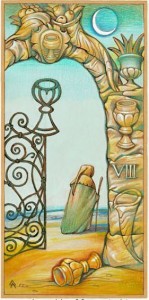
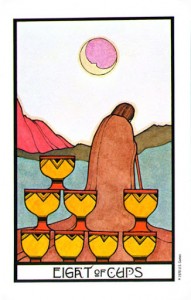
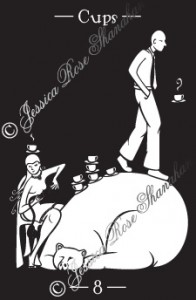
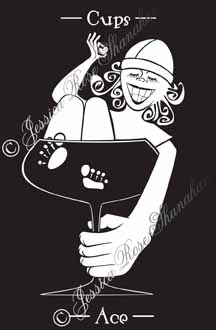
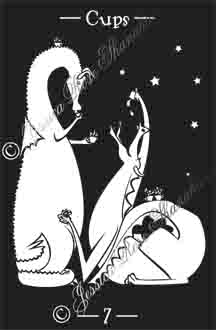
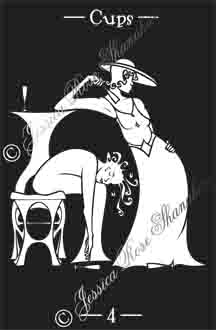 When I first began illustrating this deck, I had no overall knowledge of the tarot deck. The cards seemed to all have random and varied meanings. I searched through one deck after another looking for cohesiveness. I couldn’t always see how the meaning of the card was depicted in the image, and many of the images within a single deck seemed incredibly similar. I was ignorant, of course. Sometimes wonderful new things come of ignorance. Other times, experienced people are just confused by the ignorance of others. I hope my deck contains more images which evoke the former sentiment (wonder) rather than the later (confusion).
When I first began illustrating this deck, I had no overall knowledge of the tarot deck. The cards seemed to all have random and varied meanings. I searched through one deck after another looking for cohesiveness. I couldn’t always see how the meaning of the card was depicted in the image, and many of the images within a single deck seemed incredibly similar. I was ignorant, of course. Sometimes wonderful new things come of ignorance. Other times, experienced people are just confused by the ignorance of others. I hope my deck contains more images which evoke the former sentiment (wonder) rather than the later (confusion).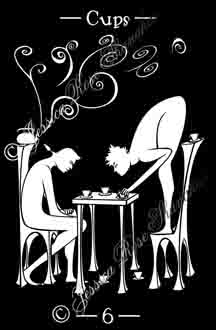 Artist: Jessica Shanahan
Artist: Jessica Shanahan